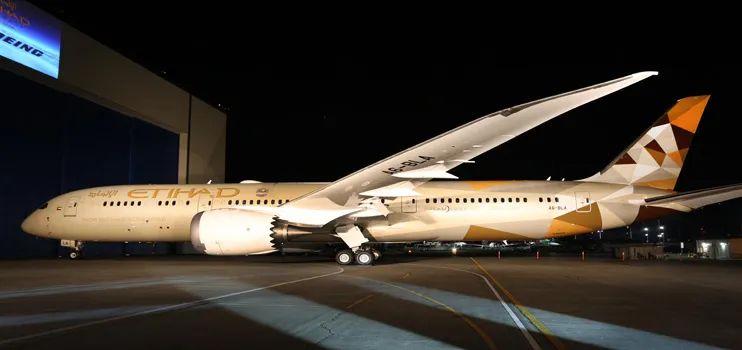
Etihad Airways announces bold emissions targets
Jan 18, 2020

Etihad Airways has unveiled ambitious emissions reduction targets aimed at significantly decreasing its carbon footprint by 2030. The airline is committed to achieving net-zero emissions by 2050, aligning with global climate goals. This initiative includes investing in sustainable aviation fuel, enhancing operational efficiencies, and modernizing its fleet with fuel-efficient aircraft. Etihad aims to collaborate with industry partners and stakeholders to drive innovation in sustainability practices. By setting these bold targets, the airline demonstrates its commitment to environmental stewardship and leadership in the aviation sector, paving the way for a greener future in air travel.
Etihad Airways, the national airline of the United Arab Emirates, has made headlines recently by announcing its ambitious emissions targets. As one of the leading airlines in the Middle East, Etihad is taking significant steps to reduce its carbon footprint and lead the aviation sector towards a more sustainable future. This article delves into the details of Etihad's emissions targets, the strategies they plan to implement, and the broader implications for the aviation industry.
Etihad's Commitment to Sustainability
In a world increasingly focused on climate change, Etihad Airways has set itself apart with its bold commitment to sustainability. The airline has pledged to achieve net-zero emissions by 2050, positioning itself as a pioneer in the aviation industry's fight against climate change. This target aligns with global efforts to reduce greenhouse gas emissions and meet international climate agreements.
Specific Emissions Targets
Etihad has outlined specific targets to reach its goal of net-zero emissions. Some of these targets include:
| Year | Target |
|---|---|
| 2025 | Reduce emissions by 20% compared to 2019 levels |
| 2030 | Achieve a 30% reduction in emissions compared to 2019 levels |
| 2050 | Reach net-zero emissions |
These milestones reflect Etihad’s proactive approach to environmental responsibility, demonstrating their commitment to sustainability in the aviation sector.
Innovative Strategies for Emission Reduction
To achieve these ambitious targets, Etihad Airways plans to implement various innovative strategies:
- Investment in Sustainable Aviation Fuel (SAF): Etihad is investing heavily in sustainable aviation fuels, which can reduce lifecycle carbon emissions by up to 80% compared to traditional jet fuels.
- Fleet Modernization: The airline is upgrading its fleet with more fuel-efficient aircraft that produce fewer emissions. Newer aircraft tend to have advanced technology that improves fuel efficiency.
- Operational Efficiency: Etihad aims to enhance operational practices, such as optimizing flight paths and reducing weight on aircraft, to improve fuel efficiency.
- Carbon Offsetting: For emissions that cannot be eliminated, Etihad is exploring carbon offsetting programs, partnering with projects that contribute to reforestation and renewable energy.
Collaboration and Partnerships
Etihad recognizes that collaboration is key to achieving its sustainability goals. The airline is engaging in partnerships with various stakeholders, including:
- Government Entities: Working with local and international governments to create policies that support sustainability in aviation.
- Industry Peers: Collaborating with other airlines and aviation companies to share best practices and technologies that reduce emissions.
- Research Institutions: Partnering with universities and research organizations to innovate in sustainable aviation technologies.
Broader Implications for the Aviation Industry
Etihad Airways' bold emissions targets have broader implications for the aviation industry. As one of the first airlines in the region to set such ambitious goals, Etihad could pave the way for others to follow suit. This could lead to:
- Increased Industry Standards: As more airlines adopt sustainability measures, the overall standards within the industry may rise, with more airlines committing to emissions reduction.
- Consumer Expectations: Passengers are increasingly concerned about the environmental impact of their travel. Airlines that prioritize sustainability may attract more customers.
- Investment in Green Technology: As airlines seek to reduce emissions, there will likely be increased investment in green technologies and innovations within the aviation sector.
Conclusion
Etihad Airways' announcement of bold emissions targets marks a significant step forward in the aviation industry’s approach to sustainability. By committing to net-zero emissions by 2050 and implementing innovative strategies, the airline is not only enhancing its operational efficiency but also setting a precedent for others in the industry. As Etihad continues to lead the way, its efforts may inspire more airlines to adopt similar goals, leading to a greener and more sustainable future for air travel.
For those looking to stay informed about sustainable practices in aviation, Etihad’s initiatives can serve as a model. The airline's commitment to reducing its carbon footprint demonstrates that it is possible to balance operational success with environmental responsibility, paving the way for a more sustainable aviation industry.
Related Articles

Explore Thailand: The Best Islands to Visit for Paradise, Adventure, and Relaxation

The Ultimate Guide to the Best Islands in Thailand for Your Next Getaway

Do babies need passports? How to get a passport for a newborn

How to get a U.S. passport fast: here’s how to expedite the process

What is Mobile Passport Control: 5 reasons why you should use it

SENTRI vs. Global Entry: A detailed guide

Do you need a passport to go to the Bahamas? Let’s find out

Do you need a passport to go to Mexico? A detailed guide

Do you need a passport to go to Canada? We got the answer

Do You Need a Passport for a Cruise: An Essential Travel Guide

Booster Seat Requirements: All the Rules to Follow in Your Rental Car

What Are the World’s Most Powerful Passports, and How Does Yours Rank?

How to Take a Passport Photo at Home: A Helpful Guide

You've got to have heart! Southwest's new livery

Your opinion: Should water be free on low cost carriers?

Young women bolder than guys as solo travellers
